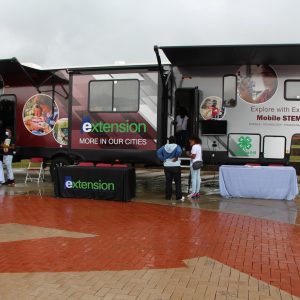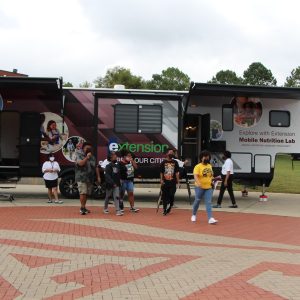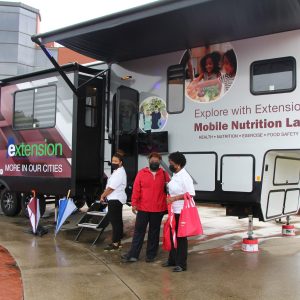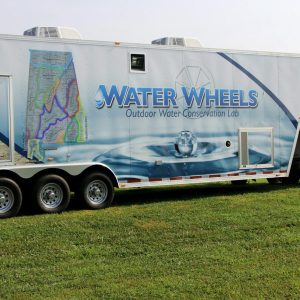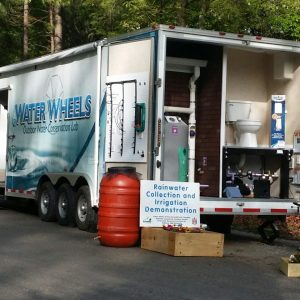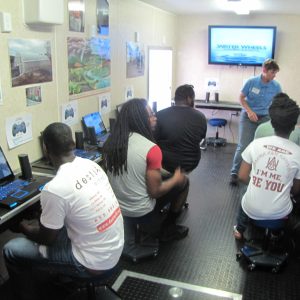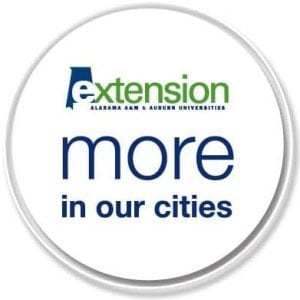Alabama Extension at Alabama A&M University

The Alabama Cooperative Extension System at Alabama A&M University (Alabama Extension at AAMU) maintains a unique approach to Extension outreach. Urban specialists develop resources that can be delivered directly to audiences online (virtually) and in local schools, community centers, and places of worship, among others. There are programs for everyone, including families, older adults, students, teachers, business owners, and community leaders. Extension plans ongoing learning programs that build relationships through a series of classes, as well as quick lessons that can be delivered in one short class.
Personalized Approach to Learning
If you are interested in learning through Urban Extension, reach out to the assistant director to see how Alabama Extension at AAMU can adapt programming to suit your needs. Agents and specialists can adjust the length of a lesson, prepare materials for all age levels, and host your group online or travel to a chosen site for program delivery.
Kimberly Sinclair Holmes
Assistant Director, Alabama Extension at AAMU
Office: (256) 372-4941
Email: ksh0035@aces.edu
Examples of personalized learning opportunities are face-to-face program series, consultations, community meetings, demonstration gardens, club meetings, on-site visits, classroom demonstrations, group classes, youth camp and field days, interactive webinars, conferences, and speaking engagements.
Mobile Education Units
The mobile education units enable Alabama Extension at AAMU to deliver high-quality innovation to youth and adults statewide. The primary target audience is underserved audiences, including communities of color who may not otherwise have access to these learning opportunities. The mobile labs were funded by the United States Department of Agriculture.
- Mobile STEM Lab
- Mobile Nutrition Lab
- Mobile Nutrition Lab
- Water Wheels
- Water Wheels
- Water Wheels
- The Mobile Nutrition Lab is a 36-foot mobile lab used to educate youth and adults about proper nutrition and the importance of physical activity, handwashing, and food safety practices. To schedule, contact Andrea Morris at (256) 372-8082 or morrian@aces.edu.
- The Mobile STEM Lab is a 36-foot mobile lab used to introduce real-world, hands-on learning experiences in science, technology, engineering, and mathematics (STEM) to youth ages 5 to 18 in communities across Alabama. To schedule, contact Angela Williams at (256) 372-5713 or arw0033@aces.edu.
- Water Wheels (Outdoor Water Conservation Laboratory) is a 36-foot mobile lab used to educate audiences about water conservation. The lab comes complete with a rainwater collection system and 15 gaming computers. To schedule, contact Rudy Pacumbaba at (256) 372-4266 or rop0001@aces.edu.
Urban Extension Program Areas
Scroll down to browse current programs or skip to a specific subject area by clicking one of the topic links below.
Animal Science & Forages • Consumer Sciences & Personal Financial Management • Community Resource Development • Family & Child Development • Forestry, Wildlife & Natural Resources • Human Nutrition, Diet & Health • Home Grounds, Gardens & Home Pests • Alabama 4-H & Youth Development
![]()
Animal Science & Forages
The Small Ruminant Program educates landowners and small-scale producers about raising healthy goats and sheep and integrating small ruminant production with forestland management. The program also explores research and best practices regarding appropriate stocking rates for silvopasture systems and the long-term effects of grazing management on tree growth, soil properties, and forage production.
Double It: Silvopasture for Dual Income is a USDA-funded capacity-building grant program designed to educate small ruminant producers about the biological and economic benefits of introducing goats to forestland areas.
Livestock Youth Connect (LYC) is a five-month internship program that equips undergraduate students with basic skills in animal care and farm management practices. The intent is to inspire students to become future farmers and/or to pursue agricultural-related careers after graduation.
Breeding for Parasite Management (BPM Alabama) is a USDA-funded capacity-building grant program that promotes the adoption of animal breeding management for the sustainable control of gastrointestinal parasites in meat goats. The program focuses on building the capacity of small ruminant producers in underserved communities in the Southeast.
![]()
Consumer Sciences & Personal Financial Management
FLIP (Financial Literacy in Progress) helps to improve economic well-being by teaching participants how to utilize the planned buying process, establish a budget, manage credit, save and invest money wisely, and involve all family members in financial decisions. This program also teaches participants how to use debt elimination software. The FLIP series can be completed in four to five, 1-hour lessons.
PREP (Promoting Readiness for Employment Possibilities) promotes job readiness by focusing on five major competencies: enhancing soft skills, completing job applications, resume building, interviewing, and properly dressing for interviews. This program can be completed in six, 1-hour sessions.
![]()
Community Resource Development
Career Countdown is an educational series for youth and adults that uses interactive lessons to provide participants with insights for linking their interests, skills, and abilities to career choices and how to create pathways to achieve career goals.
Filing for Success is a four-session series that provides a comprehensive overview of setting up a business in Alabama. New and aspiring small business owners will learn about local, state, and federal requirements and receive step-by-step guidance on forming an LLC, registering tax accounts, and more.
Small Business Café is a resource for all entrepreneurs and small business owners in Alabama looking to connect and learn. This program provides educational resources such as webinars and a public Facebook group where members can network and seek advice.
![]()
Family & Child Development
PCREP (Parent-Child Reading Enhancement Program) teaches parents and guardians techniques that will help to improve the reading level and skills of children ages 4-9 in five key areas: phonemic awareness, phonics, vocabulary, comprehension, and fluency.
SAI (Successful Aging Initiative) promotes health and estate planning for Alabama’s older adults, families, and caregivers. SAI also uses Seniors CAN, a curriculum that educates older adults on issues such as abuse, health, safety, economics, and well-being to prepare them for independent living in the latter years of life. In addition, the SAI Conference/Expo is held annually across the state.
![]()
Forestry, Wildlife & Natural Resources
EMEP (E-Waste Management Education Program) teaches the hazards of electronic waste (e-waste), the importance of recycling, and the benefits of being good stewards of the environment. EMEP works to increase awareness and help individuals adopt safe e-waste management practices.
SerPIE (Synergistic Efforts to Reduce Pharmaceutical Impacts on the Environment) offers a one-health approach to minimizing environmental impacts. The program highlights the connection between pharmaceutical drugs, personal care products, and pollution by tackling tough topics like the opioid crisis and giving the public information to safeguard their home and the environment.
UESEP (Urban Environmental Science Education Program) provides adults and youth with natural resource conservation strategies that lead to improved environmental awareness and stewardship. UESEP uses the following resources:
- Camp Conservation is an on-site field trip alternative for youth to experience environmental science education that focuses on green issues currently facing urban communities.
- Engaging Citizens through Environmental Education adapts programs regionally across the state that focuses on wildlife recovery and sustainability, GPS and geocaching, disaster preparedness, and urban forestry and ecological processes.
- Youth Exploring Environmental Science is an in-school or after-school program that pairs hands-on learning experiences with school curricula for a better understanding of environmental science issues.
- Eco-friendly Fridays Environmental Education Series teaches best management practices to help reduce your ecological footprint.
- Lend an EAR: Environmental Awareness through Reading Storytime Series engages K-5th grade students through reading and interactive activities.
- Teen Nature Club offers 6-10th grade students an opportunity to explore the natural world around them and enhance their stewardship.
![]()
Human Nutrition, Diet & Health
CHAMPION (Community Health, Aerobics & Motivational Program, Initiating Optimal Nutrition) is a learning series focused on the prevention & understanding of chronic diseases like heart disease & diabetes. The program provides interactive education to improve eating habits, increase physical activity, and decrease chronic disease risk factors through health literacy. Educational components of this program include: Walking Like a CHAMPION to promote physical activity; CHAMPION Tour to Health to encourage youth and adults to live healthier lives; and Shaping Your Health which focuses on health literacy. CHAMPION can be completed in eight one-hour classes.
TEEN (Technology Enhancing Exercise and Nutrition) uses technology, such as apps, exergaming, and health-related websites to engage teens. These tools are used to increase knowledge of nutrition and exercise in an effort to reduce childhood obesity. TEEN is an active program that works great in a school gym or other large areas where participants can spread out and move. TEEN can be broken down into 10 one-hour lessons: four nutrition lessons, two food demonstration lessons, and four iDance activities.
Urban EFNEP (Expanded Food and Nutrition Education Program) is geared towards limited-resource Hispanic mothers with children under five, teaching them how to consume healthy foods on a limited budget and encouraging daily physical activity for the whole family. A typical program can be completed in 6–8 lessons.
Urban SNAP-Ed (Supplemental Nutrition Assistance Program-Education) makes food easy, tasty, and affordable! Using evidence-based teaching methods, limited-resource families and individuals are encouraged to select nutritious food, be physically active, maximize food budgets with smart shopping tips, utilize healthy cooking techniques, and keep food safe during purchase, preparation, and storage. This program is comprised of ten lessons (one-hour each) that can be combined to meet scheduling needs.
- Mobile Nutrition Lab is a 36-foot mobile lab used to educate youth and adults about proper nutrition and the importance of physical activity, handwashing, and food safety practices.
Urban Youth STEAM Academy (Science, Technology, Engineering, Agriculture, and Mathematics) is a laboratory-based program using tower gardens to encourage youth to eat healthier and obstacle courses to increase physical activity. It also fosters youth interest in pursuing STEAM majors and careers.
![]()
Home Grounds, Gardens & Home Pests
Urban Home Grounds and Urban Agriculture encompass educational opportunities for urban/suburban small farms and residential clientele. Programs are designed to revive brownfields for community food production or small business utilization, promote water and natural resource conservation, inspire community development in urban food deserts, and establish landscaping management and urban agricultural practices. The following programs are used:
- Food Facts provides researched-based information on genetically modified organisms (GMOs), modern agricultural practices, food development, and testing to help communities make wise food choices based on facts.
- Learn to Grow increases the intake of local fresh fruits and vegetables to improve nutrition and health, raises awareness about GMOs, and educates communities about economical gardening in urban spaces (1-2 hour class).
- STEM in the Garden offers train-the-trainer workshops to help teachers and volunteer educators educate youth about STEM-related agricultural practices, the benefits of eating fresh produce, environmental conservation, and beneficial organisms, including pollinators such as bees.
- Urban Green introduces sustainable landscaping management practices, including green space development by revitalizing downtown areas and improving the utilization of urban spaces for community aesthetics and health. It also features the Back-2-Basics series.
- Water Wheels (Outdoor Water Conservation Laboratory) is a 36-foot mobile lab used to educate audiences about water conservation. The lab comes complete with a rainwater collection system and 15 gaming computers.
![]()
Alabama 4-H & Youth Development
Health Rocks!® is a national healthy-living program for youth ages 8-14 designed to reduce the use of tobacco, alcohol, and other substances by preteens and teens. This program is comprised of ten lessons (one-hour each) that can be delivered over two to ten days to meet the scheduling needs of teachers.
HYPE (Helping Youth Promote Empathy) is a four-session program that brings individuals together within schools and communities to decrease harassment, victimization, and bullying. Participants learn how to identify bullying behaviors, develop intervention strategies to combat bullying and recognize the impact bullying and violence have on mental health.
schools and communities to decrease harassment, victimization, and bullying. Participants learn how to identify bullying behaviors, develop intervention strategies to combat bullying and recognize the impact bullying and violence have on mental health.
STREAM (Science, Technology, Reading, Engineering, Arts/Agriculture and Mathematics) program helps to improve reading and introduces youth to content, skills, and practices for future success in STEM disciplines and careers. STREAM can be completed in four one-hour lessons.
- Mobile STEM Lab is a 36-foot mobile lab used to introduce real-world, hands-on learning experiences in science, technology, engineering, and mathematics (STEM) to youth ages 5-18 in communities across Alabama.


